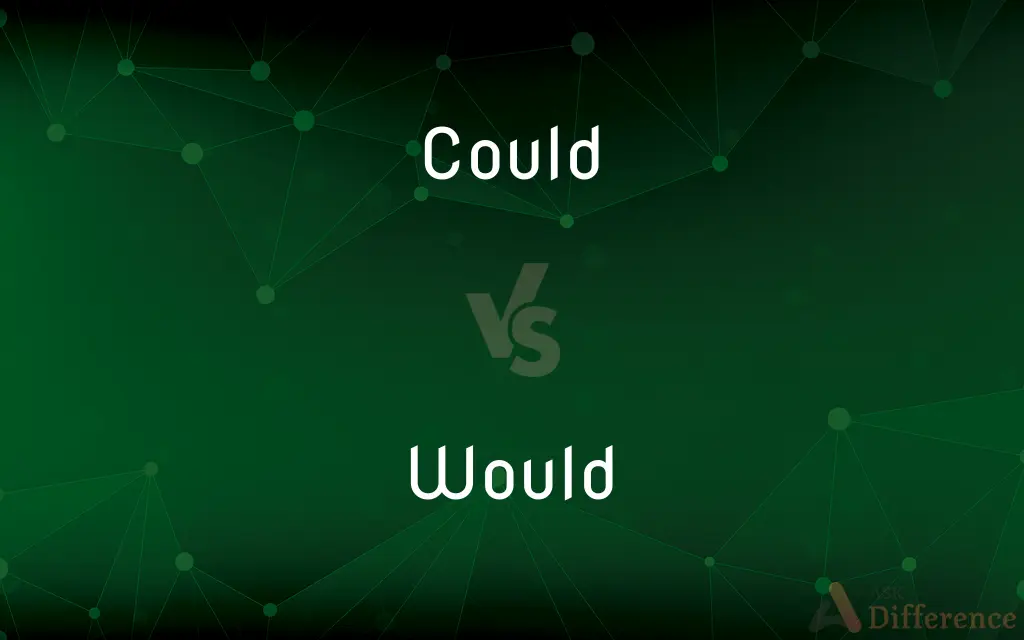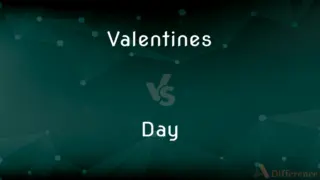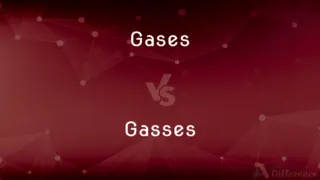Could vs. Would — What's the Difference?
Edited by Tayyaba Rehman — By Fiza Rafique — Updated on September 26, 2023
"Could" is the past tense of "can" and indicates the ability or possibility of doing something. "Would" is a conditional verb expressing a future or hypothetical action based on a condition.

Difference Between Could and Would
Table of Contents
ADVERTISEMENT
Key Differences
Could: Primarily deals with capability, ability, or potential. Would: Often relates to choice, willingness, or hypothetical situations.
Could: Can be used to talk about past or present abilities and possibilities. Would: Typically used for future actions or hypothetical scenarios.
Could: Often found in sentences discussing skills or options. Would: Frequently seen in conditional sentences and expressing preferences.
Comparison Chart
Grammatical Tense
Past tense of "can"; indicates ability
Conditional verb; expresses choice
Ability and Possibility
Focuses on capability and potential
Emphasizes willingness and preference
ADVERTISEMENT
Time Frame
Used for past or present abilities
Mainly used for future or hypothetical situations
Example (Ability)
She could swim well as a child.
If he had the chance, he would visit Europe.
Example (Condition)
If I had the time, I could help you.
Would you come if I invited you?
Compare with Definitions
Could
"Could" is the past tense of "can," denoting ability.
She could play the piano at a young age.
Would
"Would" is a conditional verb expressing choice.
Would you like tea or coffee?
Could
It's used to describe past abilities.
He could speak five languages fluently.
Would
Past of will, in various senses
The windows would not close
He said he would be away for a couple of days
She wouldn't leave
Could
"Could" often appears in polite requests.
Could you please pass the salt?
Would
(expressing the conditional mood) indicating the consequence of an imagined event or situation
He would lose his job if he were identified
Could
Past of can
Would
Expressing a desire or inclination
I would love to work in America
Would you like some water?
Could
Inflection of can
Would
Expressing a polite request
Would you pour the wine, please?
Could
Used as a past subjunctive (contrary to fact).
I think he could do it if he really wanted to.
I wish I could fly!
Would
Expressing a conjecture, opinion, or hope
I would imagine that they're home by now
I guess some people would consider it brutal
I would have to agree
Could
Used to politely ask for permission to do something.
Could I borrow your coat?
Would
Used to make a comment about behaviour that is typical
They would say that, wouldn't they?
Could
Used to politely ask for someone else to do something.
Could you proofread this email?
Would
Expressing a wish or regret
Would that he had lived to finish it
Could
Used to show the possibility that something might happen.
We could rearrange the time if you like.
Would
Past tense of will; usually followed by a bare infinitive.
Could
Used to suggest something.
You could try adding more salt to the soup.
Would
Used to form the "anterior future", or "future in the past", indicating a futurity relative to a past time.
On my first day at University, I met the woman who would become my wife.
Could
Past participle of can
Would
Used to; was or were habitually accustomed to; indicating an action in the past that happened repeatedly or commonly.
When we were younger, we would cycle out to the beach most summer Sundays.
Could
Something that could happen, or could be the case, under different circumstances; a potentiality.
Would
Was or were determined to; indicating someone's insistence upon doing something.
I asked her to stay in with me, but she would go out.
Could
Was, should be, or would be, able, capable, or susceptible. Used as an auxiliary, in the past tense or in the conditional present.
Would
Could naturally have been expected to (given the tendencies of someone's character etc.).
He denied it, but then he would, wouldn't he?
Could
It signifies potential or permission.
You could travel anywhere with a passport.
Would
(archaic) Wanted to.
Could
"Could" can indicate conditional possibilities.
If she tried, she could win the race.
Would
(archaic) Used with ellipsis of the infinitive verb, or postponement to a relative clause, in various senses.
Would
(obsolete) Wished, desired (something).
Would
A modal verb, the subjunctive of will; usually followed by a bare infinitive.
Would
Used as the auxiliary of the simple conditional modality, indicating a state or action that is conditional on another.
If I won the lottery, I would give half the money to charity.
Would
Without explicit condition, or with loose or vague implied condition, indicating a hypothetical or imagined state or action.
I would love to come and visit.
Look at that yummy cake! I would eat that all up!
Would
Suggesting conditionality or potentiality in order to express a sense of politeness, tentativeness, indirectness, hesitancy, uncertainty, etc.
I would ask you all to sit down.
I would imagine that they have already left.
Would
Used to express what the speaker would do in another person's situation, as a means of giving a suggestion or recommendation.
It's disgraceful the way that they've treated you. I would write and complain.
Would
Used to express the speaker's belief or assumption.
He's very security-conscious, so he would have remembered to lock the door.
They would be arriving in London round about now.
Would
Used interrogatively to express a polite request; are (you) willing to …?
Would you pass the salt, please?
Would
Might wish (+ verb in past subjunctive); often used in the first person (with or without that) in the sense of "if only".
Would
Might desire; wish (something).
Would
Something that would happen, or would be the case, under different circumstances; a potentiality.
Would
Commonly used as an auxiliary verb, either in the past tense or in the conditional or optative present. See 2d & 3d Will.
Right as our Lord hath would.
Would
See 2d Weld.
Would
It denotes willingness or preference.
He would rather stay in tonight.
Would
"Would" often introduces hypothetical situations.
If I were you, I would take the job offer.
Would
It can indicate future actions based on conditions.
She would travel more if she had the time.
Would
"Would" is used for polite requests.
Would you mind closing the door?
Common Curiosities
What is the primary use of "could"?
"Could" primarily indicates past or present abilities and possibilities.
Can "could" be used in conditional sentences?
Yes, it can indicate conditional possibilities, such as "If he tried, he could succeed."
Does "could" have a future tense form?
No, it primarily deals with past and present situations.
Can "would" indicate willingness?
Yes, it often signifies willingness, as in "He would help if you asked."
Is "could" used in polite requests?
Yes, it's commonly used for polite requests, like "Could you help me?"
What is the main function of "would" in a sentence?
"Would" is a conditional verb that expresses choices, preferences, and hypothetical scenarios.
Can "would" be used for polite requests?
Yes, it is commonly used for polite requests like "Would you please pass the salt?"
Can "could" express permission?
Yes, it can indicate permission or potential, as in "You could visit anytime."
Does "would" always relate to the future?
No, "would" can also refer to hypothetical situations in the past or present.
Is "would" used in conditional sentences?
Yes, it's frequently used in conditional sentences to express hypothetical outcomes.
Share Your Discovery

Previous Comparison
Valentines vs. Day
Next Comparison
Gases vs. GassesAuthor Spotlight
Written by
Fiza RafiqueFiza Rafique is a skilled content writer at AskDifference.com, where she meticulously refines and enhances written pieces. Drawing from her vast editorial expertise, Fiza ensures clarity, accuracy, and precision in every article. Passionate about language, she continually seeks to elevate the quality of content for readers worldwide.
Edited by
Tayyaba RehmanTayyaba Rehman is a distinguished writer, currently serving as a primary contributor to askdifference.com. As a researcher in semantics and etymology, Tayyaba's passion for the complexity of languages and their distinctions has found a perfect home on the platform. Tayyaba delves into the intricacies of language, distinguishing between commonly confused words and phrases, thereby providing clarity for readers worldwide.














































